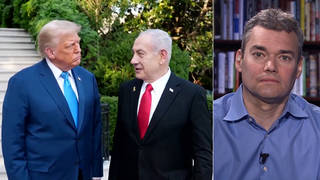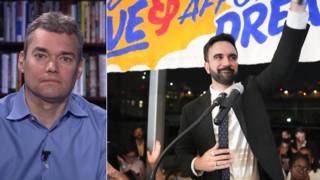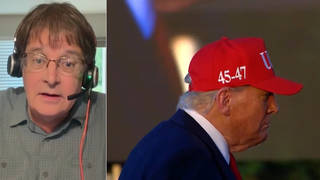
Topics
As pressure mounts for President Bush to fire senior adviser Karl Rove for his role in the outing of undercover CIA operative Valerie Plame, we take a look at her reported work as a ”NOC“–“nonofficial cover”. We speak with investigative journalist Bob Dreyfuss, the first American reporter to cover the CIA’s Non-Official Cover program. [includes rush transcript]
We now to turn to the CIA leak case that has recently been dominating the headlines. In the latest news, President Bush is appearing to backtrack on his pledge to fire anyone involved in the outing of undercover CIA operative Valerie Plame. Bush said on Monday he will fire anyone who “committed a crime” in the leak.
On June 10, 2004, Bush was asked whether he stood by an earlier White House pledge to fire anyone found to have leaked the officer’s name, Bush replied: “Yes.” On Monday, he added the qualifier that it would have to be demonstrated that a crime was committed.
While it is clear that chief presidential advisor Karl Rove played a role in the outing of Plame as a CIA operative, whether he broke the law or not is still a matter of debate
Under the Intelligence Identities Protection Act, prosecutors would have to prove that Rove knew Plame was operating undercover. During the 1990’s, Plame posed as a private energy consultant while actually working for a CIA department tracking weapons proliferation. The Los Angeles Times reported this weekend, that Plame worked under what is known as “nonofficial cover” or NOC.
- Robert Dreyfuss, investigative reporter and contributing editor at Mother Jones, the Nation and American Prospect. He was the first American reporter to cover the CIA’s Non-Official Cover program, or NOC. His new book is “Devil’s Game: How the United States Helped Unleash Fundamentalist Islam.” It is coming out in October from Henry Holt as part of the American Empire Project.
Read Dreyfuss’ two-part series on an exit strategy from Iraq:
- The Vietnam Solution
- An Iraqi Peace Process
Transcript
AMY GOODMAN: Bob Dreyfuss is with us. He’s the first U.S. reporter to cover the C.I.A.'s N.O.C. program. He is an investigative reporter, contributing editor at Mother Jones magazine, The Nation, and The American Prospect. He covered Non-Official Cover in a piece he did some ten years ago. His forthcoming book is called _Devil's Game: How the United States Helped Unleash Fundamentalist Islam_. Welcome to Democracy Now!
ROBERT DREYFUSS: Thanks, Amy. Glad to be here.
AMY GOODMAN: It’s good to have you with us. Talk about what N.O.C. is and what you exposed more than ten years ago.
ROBERT DREYFUSS: Well, N.O.C. stands for Non-Official Cover. At the time that I wrote my piece in Mother Jones magazine, I believe there was something like 100 or 120 N.O.C. officers serving for the C.I.A. overseas. I don’t know what the current number would be, but there have been calls for years now to significantly, in fact, hugely increase that number, especially after 9/11.
What these N.O.C. officers are, at the time that I wrote, were very often people who worked for major American corporations, banks, oil companies, perhaps arms companies, even, you know, consumer companies. What would happen is the C.I.A. would go to a major company to its C.E.O. and say, ’We’d like you to provide cover for one of our folks to serve overseas.’ And they would create a fictitious job, again in a major company, in Fortune 500 companies. They would create a fictitious job for somebody, let’s say at a bank in Kuwait, and then that person would, in fact, be a full-time, not an employee of that company, but a full-time C.I.A. officer conducting espionage.
This is a program that goes back many, many years. It’s been riddled with corruption. It’s been — it’s been often put on the backburner at the C.I.A. because it’s very expensive to create these kinds of fictitious jobs. And there are many, many concerns with a program like this. First of all, these people overseas don’t have diplomatic protection, so if they’re caught they can be arrested and sentenced to, you know, life in prison or executed, for one thing.
By working for private companies they can put the entire company’s reputation and all of its employees at risk. In other words, if somebody says, 'Oh, this guy who works for Citibank in Indonesia is actually a C.I.A. officer,' well, all of that bank’s employees could be then in turn accused of being C.I.A. people and, in fact, it could — it puts suspicion of being a C.I.A. person on anybody who works for the United States overseas, because if the C.I.A. is known, as they do, to put these people in those kind of jobs, then any American who works for any company is liable to be accused of being a C.I.A. officer.
That happened to journalists. It’s one of the reasons why the C.I.A. has an administrative provision not to use journalist cover overseas. As well, I think they decided not to use religious cover and a couple of others. But, business cover is something that’s now come to prominence. And I think it’s something to be concerned about, not to cheerlead. But for the last ten years, starting with Newt Gingrich when he was Speaker, and now all this talk about increasing humint, or human intelligence, that means getting more spies overseas supposedly to be part of a war on terrorism but, in fact, to do what the C.I.A. has always done, which is to covertly advance American interests abroad.
AMY GOODMAN: You wrote in your original piece about the companies that use N.O.C., that used — have sponsored Non-Official Cover overseas, N.O.C.s, as they’re called, people who are undercover using these companies as a cover for them. And you say there are RJR Nabisco, Prentice-Hall, Ford Motor Company, Procter & Gamble, General Electric, IBM, Bank of America, Chase Manhattan Bank, Pan-Am, Rockwell, Campbell Soup and Sears Roebuck. Why would a corporation do this?
ROBERT DREYFUSS: Well, you know, I asked a lot of these companies when I was doing that story, and nobody would talk about it. Now, in the company, by the way, nobody knows about this, except for probably the C.E.O., the general counsel, that is the chief lawyer, and the immediate supervisor of the person overseas who is doing this work. Obviously, the employees of Campbell Soup or RJR don’t know that there are C.I.A. people in their midst. The reason they do it? Patriotism, maybe they get information. You know, there’s all kinds of potential for corruption involved.
At the time that I was writing about this, the issue came up because of economic espionage. The Cold War had ended. The C.I.A. was turning its attention then, and still is, to spying on economic issues. You know, people don’t realize, but the C.I.A. provides information not just to the Pentagon, but to the Federal Reserve. If the chairman — if Alan Greenspan wants to know if the Germans are going to increase interest rates next month, he can use the C.I.A. to spy on the Bundesbank in Germany. That’s routine. That happens every day.
Same thing with major aerospace and, you know, Boeing contracts and fights with Airbus, banking deals. I mean, all kinds of things the United States can find out economic information abroad and use it for competitive purposes. So, a lot of these N.O.C.s are put into business jobs, not to meet terrorists, obviously, but to hobnob with bankers, high-tech executives, you know, other people who might have information about economic issues that would relate to the oil market or countless other things where the United States has a “national interest,” quote/unquote.
AMY GOODMAN: Bechtel also, add to that list. Some of these companies, certainly, you know, active today in Iraq. Do you know what N.O.C. is today?
ROBERT DREYFUSS: I haven’t researched this topic lately. I would assume from what I have read, and talking to some people, that there’s been a significant expansion of the N.O.C. program. In Congress, it has sort of come out of the closet, and members of Congress who ten years ago didn’t know what N.O.C. stood for now throw this around. You know, ’We’ve got to have more N.O.C.s.’
You know, and I guess the theory is if we’re fighting terrorism, we can’t have people in business suits in our embassies meeting with, you know, skullduggery-minded terrorists. So we need to send people oversees who can infiltrate terrorist groups. Well, we’re not using these corporation executives, either, to do that, nor are we using people like Valerie Plame to do that. I mean, she clearly was not just by her appearance someone who could go around hobnobbing with Islamic fundamentalist murderers.
So, the idea that somehow by increasing our use of N.O.C.s overseas, we’re going to be able to fight terrorism, I think is ludicrous. What it does do, however, is give us one more additional covert operations arm by which the United States can increase its influence overseas in the great struggle for hegemony that’s underway.
AMY GOODMAN: Bob Dreyfuss, a reporter who reported extensively more than ten years ago about the N.O.C. program, Non-Official Cover program of the C.I.A. We’re going to come back to him after break and also ask about the two-part series he has done on a timetable for withdrawal from Iraq.
[break]
AMY GOODMAN: We’re talking to investigative reporter, Robert Dreyfuss, both about Non-Official Cover, which is now coming back into the news, Valerie Plame being a N.O.C., Non-Official Cover, undercover in the Central Intelligence Agency beginning in the 1990s. Looking at the piece in the Los Angeles Times this weekend, saying, “Plame worked under official cover early in her career, but moved to non-official commercial cover during the nineties, maintaining that status even after she returned from overseas work to work at the C.I.A. headquarters. Federal election records show in ’99 she listed as her employer a Boston firm named Brewster Jennings & Associates, which former agency officials acknowledge was a front company.”
But I wanted to move on now to a piece — two pieces that you have written on the Iraqi peace process and what you believe needs to be happening now, Robert Dreyfuss.
ROBERT DREYFUSS: Yeah. I started thinking about Vietnam, and it occurred to me, and obviously several other people, too, and this is starting to become, I think, hopefully a movement here in Washington and around the country to develop a concrete exit strategy for Iraq. In Vietnam, we realized that the war was lost at a certain point, at a high level in the government. And we decided to open talks with the North Vietnamese and the Vietcong in Paris in 1972, and that, of course, led to our withdrawal from Vietnam.
I think it’s clear from what I know about Iraq — and I’ve done a lot of reporting about this over the last several years — that it’s way past time to start opening up a negotiation with the resistance, with the insurgency in Iraq. That’s a difficult thing to do, because if they became public at this point, we’d bomb them or kill them. So we need to create space for the political opposition in Iraq — mostly Sunnis, but extending into other parts of the country, as well — to come forward and sit down with us in a negotiation fashion; and I proposed in my pieces going to probably Amman, Jordan, where there’s a precedent for, you know, these kinds of discussions and where apparently some of the Sunni opposition leaders still live, the Sunni Iraqi opposition.
Anyway, and in getting some kind of talks going that would supersede this government that we’ve created and put in place. It is, by the way, still an interim government. This is not the real government of Iraq, this — under Prime Minister Jaafari, who’s probably an Iranian agent. This government in Iraq is something that we created out of our own bungling; and now I think it’s time to abandon them and move to the next phase of our presence in Iraq, which is a rapid withdrawal, but based on a discussion and negotiations with the opposition groups there.
AMY GOODMAN: And what is your understanding of where the administration is on this? I mean, we know they’re opposed on the outside, but what’s going on behind the scenes?
ROBERT DREYFUSS: Well, after I wrote my pieces I heard from some, you know, people who wrote to me, State Department types and others, saying, there’s a lot of concern about this and people are looking for options, looking for ways out. I don’t know that the White House is thinking along those lines. I think quite the opposite. The President is notoriously stubborn, and I’m sure would resist this to the bitter, bitter end.
On the other hand, I think that this — from the far left to the fairly moderate conservative parts of the spectrum, you’ve got more and more people thinking about exit strategies; so I think as long as all of those different kinds of discussions get underway in a sort of a combined and uneven fashion, eventually it will create enough political pressure on the administration to start taking it seriously. Ultimately, the White House has to give a green light for this. We can’t get out of Iraq just because a lot of people want to get out. The President has to decide to go ahead with that.
So, what I’m trying to do is get a discussion going about sort of what I call the “Vietnam solution” of how we can start thinking about an exit strategy that isn’t as simple as just setting a date and pulling out. I mean, I’d love to do that, but it’s not going to fly, and it might even leave worse chaos in its wake. So, a responsible way out is to start thinking about a roundtable negotiations process; and I think there’s a lot of potential for that, even among the Shiites. Most Iraqi Shiites are not supporters of these extreme right-wing Islamists and Ayatollah Sistani and these people. Iraqi Shiites, many of them are secular; and they have now found that this Shiite theocracy is being imposed on them.
The reports out of Basra are just chilling that these Shiite paramilitary groups and gangs are imposing a real hell on that city, which was once a secular and prosperous one — bombing liquor stores, and closing movie theaters, and forcing women to cover up, and assassinating secular leaders and intellectuals. I mean, what’s happening in Basra is a huge scandal and, of course, in the United States, people say, 'Oh, well, there's no insurgency there.’ That’s because the guys we’re supporting in Basra are these crazy Shiite fundamentalists; and it seems peaceful to us because they’re not attacking us. What they’re doing is attacking the secular opposition.
AMY GOODMAN: We’re going to have to leave it there.
ROBERT DREYFUSS: So those are the people we need to negotiate with. Yeah. Yeah.
AMY GOODMAN: Bob Dreyfuss, I want to thank you for being with us, an investigative reporter and contributing editor at Mother Jones magazine, The Nation and the American Prospect. Thank you. His forthcoming book is called, Devil’s Game: How the U.S. Helped Unleash Fundamentalist Islam.













Media Options